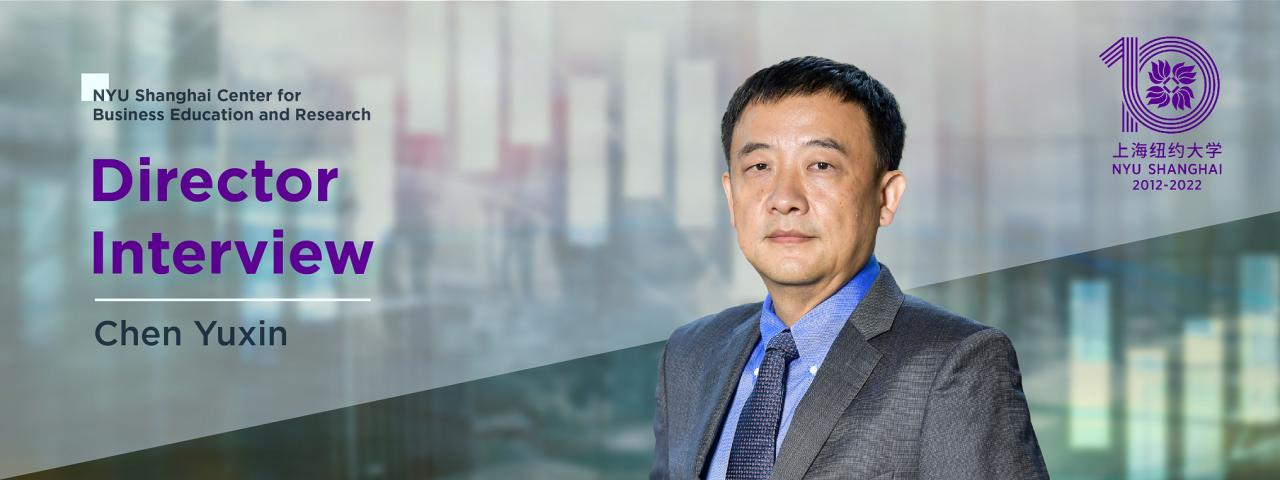
NYU Shanghai Center for Business Education and Research (CBER) aims to promote innovative research on business and to inspire academic collaboration among industry leaders, business faculty, and students through a variety of co-curricular activities. Since its founding in 2015, CBER has become a bridge connecting NYU Shanghai with the business world. Recently, CBER Director, Dean of Business, and Distinguished Global Professor of Business Chen Yuxin sat down with us to reflect on CBER’s mission and share its future plans relating to the new Qiantan campus. “Qiantan is slated to become a new international business zone attracting headquarters of multinational corporations”, he said. “We see great cooperation potential in this area as it echoes NYU Shanghai’s strong reputation for international cooperation. We hope to work closely with Qiantan businesses to contribute to Shanghai’s business development.”
Over the past decade, how has CBER pursued its mission?
CBER’s mission lies in bridging NYU Shanghai with the business world to promote inspiring communications and explorations in business education and research in Shanghai and beyond. Our key focus is to be the “bridge.” The development of business education and research must be closely integrated with global business, and certainly with China’s rapidly growing economy. The essence of most business research is analysis and understanding of the industry. Thus, we want to make CBER a bridge that can facilitate NYU Shanghai’s connection with industry, in order to grasp the cutting-edge business research trends and integrate business research with its applications.
For example, in 2021, CBER formed a team of senior business professors and young researchers to contribute to “developing Shanghai as an international consumer center,” as part of a national-level plan initiated by the government. Another example would be CBER’s engagement in an incubation project launched by the China National Textile And Apparel Council. The project aims to contribute to the environmental sustainability of China’s textile industry.
CBER is planning a series of new research projects, such as a public welfare-oriented program focusing on the impacts of women’s migration in first-tier cities during the pandemic, and a collaboration with a major Shanghai retail group to conduct research on “consumption cycles.” With the move to the new campus in Qiantan, CBER plans to build close connections with the industry and groups located in the vicinity. According to local government urban planning, Qiantan is slated to become a new international business zone attracting headquarters of multinational corporations. We see great cooperation potential in this area as it echoes NYU Shanghai’s strong reputation for international cooperation. We hope to fully play up our location advantage and give full play to NYU Shanghai’s characteristics, while working closely with Qiantan businesses to contribute to Shanghai’s business development.
In the 8 years since its founding, CBER has invited a number of world-renowned leaders from various sectors to share their insights. What insights have you gained from this kind of event?
In some sense, I guess it’s fair to say that NYU Shanghai’s business education is “pure.” Firstly, it’s not utilitarian-oriented. Sometimes the public would tend to believe that business is all about “money” – however, business studies are much more profound than that. As a comprehensive discipline, business encompasses many aspects, for example NGO management, sustainable development, and consumer habit-based urban planning. CBER has held many events aimed at generating public good.
For example, this spring CBER launched a series of dialogues with international development finance leaders, hosted by Visiting Professor of Business and former World Bank Treasurer Hua Jingdong. Guests including Women of the World Endowment founder and CEO Patience Marime-Ball, Asia Infrastructure Investment Bank (AIIB) CFO Andrew Cross, and Shrey Kohli, head of debt capital markets at the London Stock Exchange, to share their analysis and insights on key issues in international development and finance.
This semester we kicked off a new dialogue series with female leaders in finance and development. The first guest was International Fund for Agriculture Development (IFAD) Associate Vice President Katherine Meighan. She shared her distinctive thoughts and perspectives on topics ranging from career development, to global citizenship, and solutions for poverty and hunger alleviation.
Through such events, we hope to provide students from China and abroad with exposure to international development finance, to engage in dialogue and reflection with leaders in the field on key topics such as economics, finance, development and leadership, and to help students build an authentic, intuitive and in-depth understanding of the business sector and the world, thus leading them on the path to becoming leaders of the next generation.
How can CBER function as a platform to bridge NYU Shanghai with industry?
Many visionary social responsibility-minded business leaders and enterprises are eager to share their insights accumulated over the years with young people as a way to give back to society. Bringing them to NYU Shanghai to share their values and ideas is a great way for them to inspire the next generation of business leaders. While our institution is relatively small in size, we have a fairly diverse student community. A talk on the NYU Shanghai platform could potentially reach audiences from more than 70 countries, generating a global impact. CBER functions as a platform ready to facilitate such exchange and cooperation.
This interview has been edited for clarity and length.

